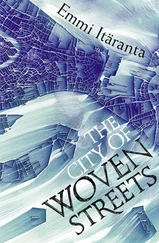Once the silent space around a secret is shattered, it cannot be made whole again.
‘Do you think it’s true?’ Sanja asked eventually. Her voice was frail, and the cracked void around us would not withdraw, it rested deep and impossible to banish like the ocean. ‘Everything she said?’
‘Yes,’ I said. ‘I think it’s true.’
‘So do I,’ Sanja said.
She switched the past-machine off. The disc slowed down and eventually stopped. Of all silences I had encountered this was the gravest and most inevitable: not the silence of secrets, but of knowing.
That night, when the house was empty and the garden still, and no one was moving on the road, I walked to the spring. The sun was brushing the horizon, but would not drop below it, and the summer night was brighter than a midwinter day.
My lantern cast a glow on the dark rock walls of the fell. When I lowered it near the surface of the water, I saw what I had already sensed from further away.
The surface had sunk. Not dangerously so, but it was lower than I remembered seeing it before.
The white mark on the rock glinted below the water like a wide, blind eye, clearer than ever.
I lifted my insect hood, wiped my brow with a creased rag and drank a sip from a small waterskin. A swarm of dark-winged horseflies bounced about me when I lowered the hood back into place. I whirled the rag in a circle to chase them off. The heavy weather glued the garments to my skin. The summer had reached its sweltering core, and a soggy, molten sun was emanating heat behind layers of clouds. I had only managed one swap so far despite having stood on the village square for several hours. The bulky floor fan had been good enough for the baker, who had in exchange given me two shoulder-strapped sacks of dried bread. I knew the fan was worth more, but this was probably the highest price anyone in the village would pay at the moment. I needed food that was easy to carry and would keep for a long time, so it still wasn’t a bad swap.
A short, wide-boned man whose sand-coloured hair had thinned away almost entirely stopped in front of my stall. I could guess his thoughts when he observed with his pale-grey eyes the collection of objects I had gathered from the house: a couple of chairs decorated with woodcuttings, too gaudy for his living room; a handful of past-world books that no one in his house would have time to read; a tea set and a few plates he would find difficult to fill. The only thing he took a longer look at were the sandals – two old pairs that had belonged to my father, one pair that my mother had left behind. The man compared the sizes of the soles with his own well-worn footwear, but seemed to decide that he had no interest in trading those.
‘Is that cart for sale?’ he asked, pointing at the wagon of the helicycle in which I had placed some of the items on display.
‘No, it’s the only one I have,’ I replied.
‘Too bad. I’d have offered blue lotus or pipe-leaf for that,’ he said, nodded goodbye and continued on his way.
The atmosphere in the square was almost relaxed today. I had only seen two soldiers when I had arrived, and they had been leaning against a wall at the edge of the square, looking indifferent and drinking amber-coloured liquid from their waterskins. A couple of children were arranging frayed plastic mahjong tiles on the ground, someone was playing an accordion across the uneven puzzle of the stalls, and Ninia’s sister Tamara was selling trinkets and hair brooches a short distance away on the other side of the alley. It seemed strange to me that women would still want to decorate their hair. When I had mentioned this to Sanja, she had said, ‘People will hold on to what they’re used to, for as long as they can. It’s the only way to survive.’
I saw a blue uniform flashing among the stalls. It approached, until I discerned a familiar face. Major Bolin saw me as he was turning into the alley where I had set up my own table, and walked right towards me. His heavy boots left deep, sharp-edged patterns in the sand.
Bolin stopped in front of my stall. I bowed to him, and he bowed back.
‘Noria,’ he said. ‘I’ve been asking the villagers where to find you.’ He looked around and lowered his voice. ‘I got your message.’
‘Would you like some tea, Major Bolin?’ I asked.
He nodded. I gestured for him to walk around my stall. I threw a cloth over the sales table to cover the items and left the curtain of the back wall slightly open so I would see if anyone came to trade. Behind the curtain I offered a stool to Bolin and sat down on another one myself. I poured us some warm tea from a waterskin and lit a bitter-smelling incense stick to keep insects away, but horseflies kept buzzing around us when we lifted our insect hoods to drink.
‘How have you been, Noria?’ Bolin asked and sipped his tea. His face was paper-dry, his movements slower than I remembered.
‘Hanging in there,’ I said.
Bolin was quiet, twirling the tea in his ceramic cup, looking sunken in thought. Eventually he said, ‘I can help you, but I can’t do it for free. Helicarriages are expensive these days, especially if you don’t want anyone to start wondering about what you need it for.’ He raised his eyes, and I heard an unspoken question behind his words.
‘I need it to be able to go and sell chattels outside the village,’ I said. ‘I know there are more buyers for valuables in Kuusamo and Kuoloyarvi. A skilled seller can make good profit.’
Bolin examined me, and I hoped he was thinking of what I had deliberately left unmentioned: the black market, the rarer items he knew were in the tea master’s house, because he had helped my parents acquire some of them.
‘Are you sure the risk is worth the price?’ he asked.
‘There are few tea visitors these days, and even fewer pay as well as they used to.’
Bolin considered this and said then, ‘I’ve heard that the monitoring of the black market is more lenient in Kuoloyarvi than in Kuusamo. Not that such a thing would be of any interest to you, of course.’
‘How much?’ I asked, congratulating myself on my success.
Bolin leaned forward on his seat and drew a five-figure number in the sand. It was more than I had expected, but I would be able to pay it.
‘It’s a deal,’ I said. ‘When do you need the payment?’
‘Beforehand,’ Bolin replied. ‘I can send someone to fetch the money from your house tomorrow.’
‘No, it’s better if I bring it here,’ I said. ‘Is that alright?’
Bolin nodded.
‘I will see to it that no one makes a connection between the helicarriage and me,’ he said quietly. ‘I expect you to do the same.’
He drained his tea and placed the cup in the sand next to the leg of the stool. The lines on his face were deep, and they grew deeper as he spoke.
‘This is the last thing I can do for you. You know that, don’t you?’
‘Yes,’ I said.
Bolin bowed his head slightly. I bowed back. As he was walking away, a thread of ants climbed up the side of the cup to reach for the drop of liquid left at the bottom. I brushed off the numbers Bolin had drawn on the ground with the tip of my sandal, until there was nothing left but a smooth plane of sand.
The afternoon stretched towards the evening and little by little people began to collect their stalls and merchandise. I detached the curtain from the supporting poles and folded it. I arranged my items in the cart, lifted the bread sacks among them, and when everything was in place and I had bound straps to hold the load, I steered the helicycle towards the tea master’s house. I passed leather-brown, nodding gardens, the medical centre that stared out to the road with blank windows and people returning home from the market. From afar I could see a low, red-brick house and the bright-blue circle on its door. It was the latest house in the village to bear the mark of a water crime. The circle had appeared on the door five weeks earlier. I turned from my route to take a detour so I wouldn’t need to drive directly past the marked door.
Читать дальше
Конец ознакомительного отрывка
Купить книгу












